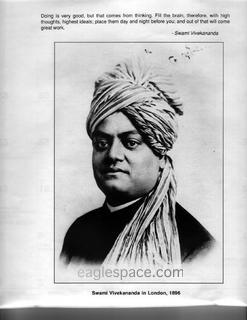The Work Before Us – Swami Vivekananda
In his essay titled “The Work Before Us”, Swami Vivekananda talks about the need for us to get rid of “the hundreds of supserstitions that we have been hugging to our breasts for centuries”. If we are to set out to “conquer the world through our spirituality and philosophy” by the “sending out of life-giving principles”, our “superstitions have to be weeded out and thrown aside, so that they may die forever”. Vivekananda further says:
Superstitions are the causes of the degradation of the race and will lead to softening of the brain.
And what is the result of a softened brain?
That brain which cannot think high and noble thoughts, which has lost all power of originality, which has lost all vigor…
The loss of the ability to think noble thoughts, loss of ability to be original and to create, and be without vigor – such are the casualties inflicted by superstition.
…that brain which is always poisoning itself with all sorts of little superstitions passing under the name of religion, we must beware of
How many times have you wondered, when doing a certain action (in the name of religious practice) – this makes no sense, it does not pass the test of reason, and yet, I have been doing this for so long, so many years – why do I continue? Is this purely superstition or is there a vedic basis to these rituals, these actions? Vivekananda encourages us, exhorts us, to develop awareness of those actions which poison our brain.

Of the highest dangers facing us, two, Scylla and Charybdis, rank materialism and its opposite – arrant superstition – must be avoided
One often hears that lack of faith, fear, insincerity and such are some of the great obstacles to religious life. However, Vivekananda points to “rank materialism” – a pursuit of the materialistic life at all costs – as one of our two greatest obstacles. The other, “arrant superstition”, is the second great obstacle. The implication is that if we can conquer these two obstacles, we would have greatly progressed in our spiritual growth. A bit further in the essay, Vivekananda says:
I would rather that every one of you be rank atheists than superstitious fools – for the atheist is alive and you can make something out of him.
This is a remarkable statement. The Swami would rather have us be “rank atheists” than be superstitious. (In a separate essay, Vivekananda defines an atheist as not one who doesn’t believe in God, but rather the one who does not believe in himself). The reason, based upon the effects of superstition on the brain mentioned earlier, is clear. He reminds us of this as he continues:
If superstition enters, the brain is gone, the brain is softening, degradation has seized upon life.
What an unfortunate existence we would lead if were to be mired in degradation brought about by superstition! And now, Vivekanada delivers his call to action, to strength, as he often did in many of his works:
Brave, bold men, these are what we want. What we want is vigor in the blood, strength in the nerves, iron muscles and nerves of steel…
The Swami spells out the traits of those who would spread the life-giving principles of Vedanta. Those who exhibit bravery, boldness, vigor, strength and ‘nerves of steel’. Surely, those steeped in superstition would be hard-pressed to exhibit such qualities.
Avoid all mystery and namby-pamby ideas. There is no mystery in religion. Is there any mystery in the Vedanta, or in the Vedas, or in the Samhitas, or in the Puranas?
Religion and religious practice(s) are often infused with mystery by some who would want to hold on to the ‘key’ to the ‘secret’. This mystery-mongering becomes the fertile seed-bed of superstition.
What secret societies did the sages of yore establish to preach their religion? What sleight-of-hand tricks are there recorded as used by them to bring their grand truths to humanity?
The answer is – none. There were no secret societies, no tricks to the realization of truth.
Mystery mongering and superstition are always signs of weakness. They are always signs of degradation and of death.
Vivekananda reiterates yet again that we are to beware of those things that weaken and degrade us mentally and spiritually.
It was never preached on this soil that the truths of religion were mysteries or that they were the property of secret societies sitting on the snow-caps of the Himalayas…
These are some extremely empowering statements. In essence, Vivkenanda is saying the the truths of Vedanta are freely available to all those who aspire to seek them. There is no elite club, no admission fee, no special qualification that is needed for those who choose to seek the truth. These statements strike at the root of superstition, mystery mongering, elitism and the like of those who purport to be somehow more privileged than others to practice Vedanta and its principles.
In summary, Swami Vivekananda levels the playing field, and makes it easier for us to walk towards our own self-realization. He does exhort us to examine our beliefs carefully, and weed out the superstitions from among them. It is akin to picking the stones from among the lentils before we cook them – or we may end up with a cracked tooth! This is indeed “the work before us”. The resulting gain in strength will give us the energy to walk the path with courage, vigor and boldness.
Will we do the work and free ourselves, or will we keep living our life in the clutches of ‘materialism and superstition’ as usual?
